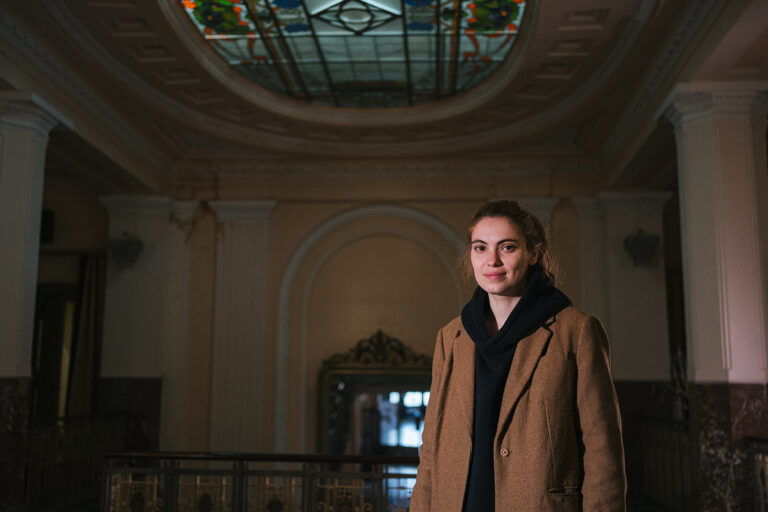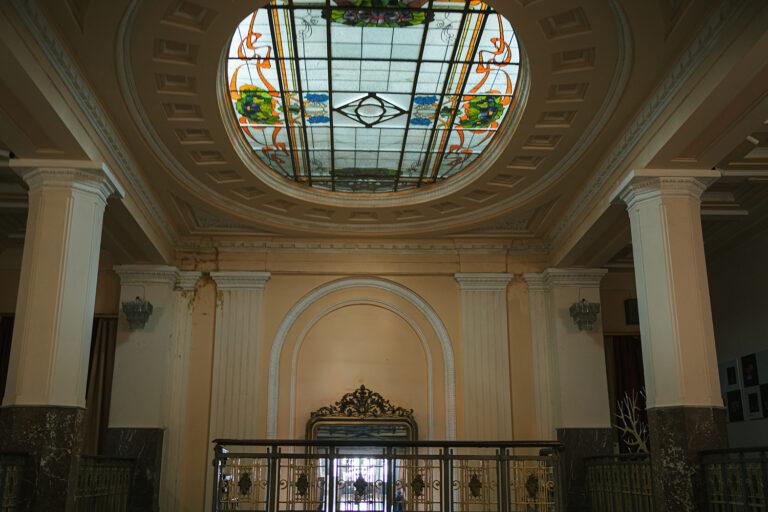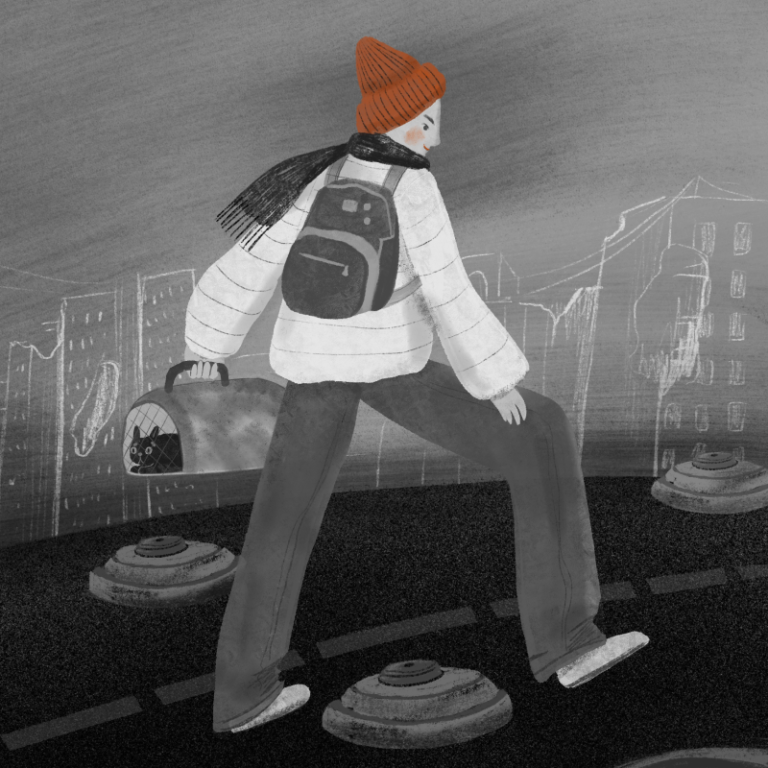“Listen to the voice of Mariupol” is a series of stories of people who managed to evacuate from the besieged city of Mariupol. The series continues with our interview with Maria, who witnessed the airstrikes on the Drama Theater on March 16. In the aftermath of this event, she decided to save her loved ones and find a way out of the city at any cost.
Maria is a communications specialist and an actress. After graduating with a degree in journalism, she joined the Theatromania folk theater troupe and worked with them for six years. She also worked on the development of the Vezha cultural and tourist center and gave guided tours around Mariupol, since she knew the city well (Maria is a member of the fourth generation in her family that lives in Mariupol). She says the people of Mariupol have been used to explosions since 2014, as the city is close to the demarcation line (with the occupied territories of Donetsk – ed.). But on February 24, none of Mariupol’s residents could have guessed what they and their city would have to go through.
— We spent 12 days travelling from Mariupol to Lviv. On the way, I was recalling the Mariupol-Lviv train, which usually takes over 24 hours. Apparently it’s the longest one in Ukraine. Last year, we took this train to go on vacation, as we had a transfer in Lviv. That trip seemed stressful to us at the time. And this time, I was already thinking: what a wonderful train that was! Because 12 days is something entirely different. Every time you sleep in a different place, you’re surrounded by strangers, buses, roads.
When we got to Lviv, we settled in the Lviv Puppet Theater. And the first thing I noticed was the glass roof. Because in Mariupol, I saw the drama theater collapsing. After that, you start paying attention to things that could be potentially dangerous for you. For example, a mirror, large windows, or something else.


slideshow
Every day in the theater we woke up, washed, and brushed our teeth. And then we spent some time in the city dealing with various matters. It’s so weird. It’s like, you don’t have a home or a job anymore, but it turns out that for a displaced person, there are enough things to do. First of all, I had to find some clothes. Because I came with only one backpack, with my laptop and documents inside. And that’s it, nothing more. We arrived wearing winter clothes because when we left Mariupol, it was snowing. We got to Lviv, and it was spring here. And I was in knee-high winter boots. So now, almost everything I wear is from the humanitarian aid headquarters. Except for my socks. They already have holes in them, I’ve darned them several times already, but I don’t want to throw them away. Because they’re from Mariupol.

When we left the city, the most important thing for me was to save our cat. When our flat was bombed, the cat got scared, climbed under the closet, and didn’t want to come out. But in the end, we decided to leave the flat, so we had to take her away somehow. And there I was, stretching my hand out. And she… I still have the scars. I told her, “Listen, kitty, Putin scratched me less than you did.”
I held her in my arms almost all the way. She was stressed and lost weight: she lost a kilo, that’s a lot for her. And so we got to Lviv: we relaxed and let go of her. She would wander freely around the theatre. But one night, the air raid alert sounded: everyone started going down to the bomb shelter, to the small stage. We took the cat with us, and she just ran away.
How stupid it is to save a cat from Mariupol and to lose her in Lviv. My mother made the situation even worse at the time, saying, “She’s probably going to die there.” As cats usually do. Then it struck me that it was like the famous old phrase “to see Paris and die”. Only, for my cat, it was “to see Lviv”. But it all worked out. Later, we found her under the stage of the concert hall – we heard her meowing. So the next few days, as we did the rounds of the various administrative service centers, we carried her everywhere with us.

In Mariupol, until March 10, we would go outside every day to search for food. Some people didn’t leave their apartments or basements at all, because they were terrified. You walk around the city and realize that many of the locals are almost hysterical. For example, every second woman who approaches you is crying and trembling. You pass by them, hearing shots here and there, but you need water. So you have no choice. Many people could not tell the sounds apart: when it was our artillery firing on the ruscists (‘Russian fascists’ — ed.), or vice versa. They were scared of absolutely everything. But we were able to realize that at that moment, for example, it was our (Ukrainian – ed.) artillery firing. So we were safe. Once, my mother and I were standing in line to collect water. At some point, our artillery began to rumble. Half of the queue just fell to the ground. And we were saying: “Yes, that’s our artillery. Are you stupid or something?” It was the normal artillery. The only artillery in the world that you don’t have to be afraid of is Ukrainian artillery. Unless, of course, you are a ruscist, or a Russian soldier.
The day the drama theater was shelled, I went to visit my uncle, who lived nearby. We had had no news from him, so I decided to go and see him. He was fine. He just asked me to go and get some water from the wells. And from there, you can see Azovstal very clearly. I look, and there are planes: tff-tff-tff. I leaned myself against the nearest building, because I knew there would be a bang. And so there was: there was an explosion, and the plane continued its course. I get closer to the theatre, and it’s in ruins. At first, I couldn’t put the pieces of the puzzle together. I see there’s no roof. I see people scattered around the park. There are a bunch of wounded people. Shouting. Part of the theatre is on fire, and I’m standing there, unable to grasp it – I was just inside there.
And then I realize that my family are in the theatre. I run to the nearest part of the building that’s still standing — and they’re not there. Then I start running and shouting, screaming like crazy. Fortunately, it turned out that they were in the parts of the theatre that hadn’t collapsed. They had gone down to the bomb shelter, from which several exits led to the street. So they were standing there, calling out for me and wondering if I was hurt because they thought I’d been in the park at the time of the explosion. The blast wave injured many people who weren’t inside the building at the time. But my family was okay.
After that, there were artillery strikes on the theatre. At this time, the fire was burning more and more fiercely. So people started shouting at the others to get out. But the square was also being shelled; it was dangerous to stay there. So everyone ran to the nearby philharmonic. But then they started firing at it with Grad rockets. Only then did I finally realize that my family and I had to find a way out of the city. So the next day, we walked towards the village of Melekine.
I didn’t feel that we had been abandoned in Mariupol. I heard Ukrainian artillery. There was fighting. Many of my friends and acquaintances from Mariupol are in the military. And I understood clearly that these people would not abandon their hometown, even if they were ordered to do so. I will say this: it’s more likely that ‘Marik’ (nickname for Mariupol — ed.) would abandon a person, than that a person would abandon ‘Marik’. While in Mariupol, I was more worried about what was happening to Ukraine in general. When we arrived in Zaporizhzhia, I finally saw a map of the hostilities and the occupied territories for the first time. Then I felt devastated. After all, it was the whole coast, the whole Kherson region! I just thought: no way!
After our arrival in Lviv, of course, it was scary to be in a theatre again. But just because the Russians fired at me once, it doesn’t mean I’m going to stop going to theatres altogether from now on. So many terrible things have happened in my life lately that if I pay attention to every trigger, I won’t be able to leave the house. Now, there are a lot of these triggers. The safest place I had in Mariupol was the corridor. Now, when I go into a corridor, I always look to see if it’s possible to sleep there. It’s just a habit now. There are sounds as well. In Lviv, it’s the sound of the tram. This sound, especially when the tram is going somewhere in the old part of the city on the cobblestones, is exactly like a salvo of rockets fired by a ‘Grad’. It goes “tu-do-do-do”.

After all I’ve been through, I think it’s better to prepare for the worst than to believe that a miracle will happen to you. Although, on the other hand, it seems to me that what happened to me is actually a miracle. And my family and I are generally very optimistic people. In Mariupol, we tried to make jokes all the time and we sang a lot. We joked that Shoigu would come to fix the broken windows in our apartment. He would get some treatment after his heart attack and then he would come to fix our windows and doors. Or when the Russian artillery was working, we would be singing “Chervona Ruta” (‘Red Rue’, a popular Ukrainian song — ed.) in the corridor. We would also often wonder about what Putin’s death should be like. Our best option: that a big concrete slab would fall on him in that bunker in the Urals. So that he would have no electricity, no means of communication, no heating, and that all his food would run out. And finally — that nobody would come for him.
This is a war for survival. As long as Putin’s cohort stays in our country, we have every chance of becoming a second Israel. We need to draw conclusions from our unpreparedness and carelessness. And continue working for the army, the army, and once more, the army. What’s more, for eight years we have been forgiving people who took the liberty of saying bad things about Ukraine and the Ukrainian language. But now, no more of that. “Suitcase, train station, Russia.” All these people who are with the “Russian world” in their thoughts… for those thoughts, however terrible it may sound… They should all be punished. If you indulge in any of these thoughts, you are a danger to our country. Therefore, there can be no pity for these people. If you are not with Ukraine, if you cannot learn our language and history, and understand where you are and what you are, then get out of here. That’s it.


